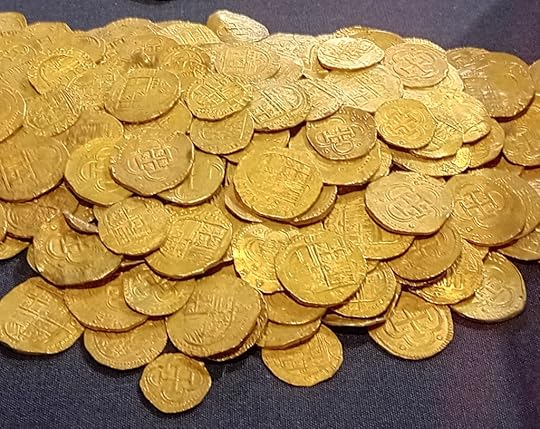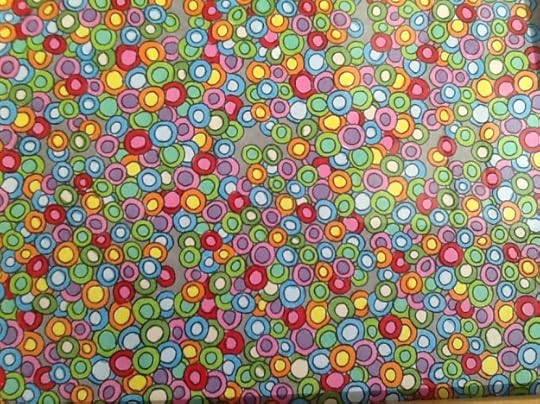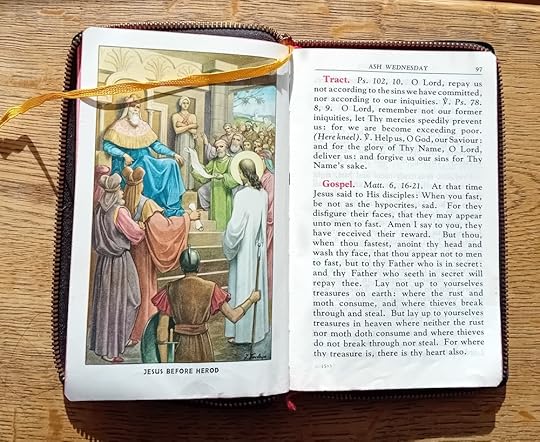Grace Tierney's Blog, page 3
May 5, 2025
The Wooden Roots of Being at Loggerheads
Hello,
Today’s word is loggerheads. The expression to be at loggerheads with somebody, meaning that you disagree with them, dates back to the late 1600s. While nowadays the disagreement in question is likely to be verbal, at that point it could be physical too, perhaps involving a weapon.
During the 1600s a loggerhead was a thick-headed iron tool used in ship-building (perhaps swung at somebody if you were at loggerheads with them?), a type of cannon shot, a part of a whale-boat, and a type of turtle.
Cannon weren’t just loaded with cannon balls. In a pinch most things could be propelled by a cannon. There was bar shot – a set of short metal bars which would whirl out in flight and take down the rigging of the enemy’s ship and chain shot which worked in a similar way but would clear a deck of crew.
The logger part of the word is probably from the dialect meaning – a heavy block of wood, sometimes used to slow down a horse and stop it wandering away. Of course wood and logs are closely related.

If somebody had a wooden head they would be seen as not very bright and sure enough the original use of loggerhead in the late 1500s was to describe a stupid person. This means that if two people are at loggerheads neither have much intellect or they’re swinging heavy wooden tools at each other – again not a smart move.
Until next time happy reading, writing, and wordfooling,
Grace (@Wordfoolery)
p.s. Want more Wordfoolery? Subscribe to the monthly newsletter “Wordfoolery Whispers”. Don’t forget to click on the confirmation email, which might hide in your spam folder.
April 28, 2025
The Whispered History of Inkling
Hello,
I’ve always liked the word inkling. It sounds cute and the concept of having an inkling of an idea neatly captures that feeling when you don’t have a fully formed idea or fact to hand and yet a shred of a thought is tantalising your mind. But, I wondered, is the word related to ink?
 ink
inkInkling has been with us since the 1400s from the Middle English verb inclen (to hint, to whisper). The trail goes cold earlier than that point. There’s inca (doubt, suspicion) in Old English and there’s another version in Middle English, nyngkiling (inkling) from nikking (a hint) which comes from nik (a notch or tally – an old way of counting by making notches on a tally stitch).
There was also the verb to inkle, from about the same time period, although it’s believed to be a back-formation from inkling. It means to have a vague idea.
Charmingly you can shrink your inkling down to be even smaller by talking about an inkleth (the slightest idea or notion). Useful for the days when your vague ideas are even vaguer than usual.
Sadly none of these words have anything to do with ink or writing. Ink has roots in Latin and Greek, in case you were wondering.
Luckily literary history steps in at this point and gives us an inky link. The Inklings was the name of a literary and fantasy fiction discussion group (what we’d call a book group or writers group these days) which ran between the early 1930s and 1949. The two most famous members were JRR Tolkien and CS Lewis.
Given Tolkien’s linguistic qualifications I’m sure they knew the roots of the word, so I can’t help wondering if their meetings were whispered affairs or they just, like me, liked the way the word sounded.
Until next time happy reading, inking, and wordfooling,
Grace (@Wordfoolery)
p.s. Want more Wordfoolery? Subscribe to the monthly newsletter “Wordfoolery Whispers”. Don’t forget to click on the confirmation email, which might hide in your spam folder.
April 21, 2025
The Rich Word History of Sumptuous
Hello,
This week’s word is one the Romans gave us and it doesn’t come cheap. I went looking for my photos from the Palace of Versailles as an example of something being sumptuous, but couldn’t find them. You’ll have to make do with a pile of gold coins from the Spanish Armada, on display at the Ulster Museum in Belfast. It’s enough to make a pirate greedy.

Something being sumptuous is because it’s seen as expensive or luxurious and it arrived in English in the late 1400s via sumptueux in Old French but it originated in sumptuosus (costly, lavish, wasteful) in Latin. This was thanks to the verb sumere (to borrow, spend, eat, consume, take). The verb was shortened from sub (under) and emere (to take or buy) so sumptuous has been linked to consumption from the very start.
It’s interesting to note that there’s an implication of excess consumption from the start too. Lavish sumptuous clothes, homes, etc will always be commented upon by those who don’t have the finances to match or keep up with that level.
One way the struggle was controlled over the years, and right across the globe, was via sumptuary laws, from the same linguistic roots. You’d find them, in various local forms, in China, Japan, ancient Greek and Rome, Britain through the centuries, Italy, and France. Naturally as laws were generally created by those at the top, these laws controlled the consumption at lower levels of society, rather than the other way around.
For example, only the elite could use the imperial purple dye for their clothes in ancient Rome. Which furs you adorned yourself with were controlled in Britain, and France liked to limit the use of gold in fashion to the nobility.
The idea was ostensibly to restrain extravagance and excessive spending on clothes, food, and furnishings but often the sumptuary laws existed to clarify and illustrate social rank and class. Nobility didn’t want rich merchants to enfringe on their way of life. The royal family didn’t want their nobles getting ideas above their station.
Until next time happy reading, writing, and wordfooling,
Grace (@Wordfoolery)
p.s. Want more Wordfoolery? Subscribe to the monthly newsletter “Wordfoolery Whispers”. Don’t forget to click on the confirmation email, which might hide in your spam folder.
April 14, 2025
The Fruity History of the Word Marmalade
Hello,
The family and I were enjoying “Paddington in Peru” last night when Mr Wordfoolery gave me a lead on the Portuguese history of marmalade. Naturally, as a marmalade fan I had to dig into it today.

Marmalade, as I hope you know, is a clear sweetened jelly in which pieces of fruit and fruit rind are suspended. Paddington Bear prefers marmalade made from oranges, especially those from his home place of Peru, but marmalades can be made from many different fruits. My mother-in-law loves a lime marmalade, for example, and rind-less examples also exist.
The noun entered English in the 1500s and it can even be used as a verb since the 1960s – to marmalade is to spread with marmalade in much the same way that we can butter toast as a verb also.
The original meaning of marmalade in English was a preserve made from quince. It came from marmelade in French which was borrowed from marmelada in Portuguese. The Portuguese word came from marmelo (quince) thanks to Latin’s melimelum (sweet apple, a fruit from an apple tree grafted onto a quince tree). The Latin term came from Greek melimelon which is compounded from meli (honey) and melon (apple).
Take a moment. That means that marmalade, which we now associate strongly with oranges has a word history going back to quince, apples, honey, and, in a way, melons. Marmalade is starting to sound like a good term for a fruit salad.
Crucially when marmalade landed in England it wasn’t describing something containing oranges, or at least not initially. It was the 1600s before the recipe expanded to citrus fruits.
Originally they were talking about an imported item from the Iberian peninsula – a preserve of quince fruits. Personally I’ve never seen a quince tree, although I have tasted their preserved form.
The quince is a deciduous tree with hard yellow fruit which are roughly pear-shaped. They taste hard and astringent. Easy to see why they were combined with sugar to form a jelly/preserve.
That preserve, a traditional Iberian food, is called marmelada in Portugual, marmelo in Galicia, but you might know it better as membrillo from Spain. It’s quite firm and goes well with cheese. Unless you really love it, you’re probably not going to spread it on your toast for breakfast or make it into a sandwich, as Paddington would.
In other news this week (April 2025) – You never know who’s reading your books! Susie Dent mentioned me on “Countdown” on Channel 4 (minute 26 in https://www.channel4.com/…/countdown/on-demand/75051-233). She also read out an excerpt from my ebook “Modern Words with Old Roots” about the word gazebo and said the book was “really good”. Absolutely delighted as I love her work and regularly use her books from my reference shelf. Plus she read it to Stephen Fry (squeak!).
Until next time happy reading, writing, and wordfooling,
Grace (@Wordfoolery)
p.s. Want more Wordfoolery? Subscribe to the monthly newsletter “Wordfoolery Whispers”. Don’t forget to click on the confirmation email, which might hide in your spam folder. There will be a new issue out on Friday 18 April 2025.
p.p.s. this post contains affiliate links which make a small payment to the blog if you choose to purchase through them. #CommissionsEarned. Alternatively, you can use my digital tip jar to say thanks for this year’s words.
April 7, 2025
The Irish Word History of Epicentre
Hello,
This week the Oxford English Dictionary announced its latest addition of Hiberno-English words – spice bag (popular fast food – bag of spiced chips with chicken and veg), class (great), lúdramán (lazy stupid man, used in “Ulysses” by James Joyce, direct borrowing from Gaelic), morto (mortified with embarrassment), blaa (a soft white bread roll from Waterford), mineral (soft drink – because these were made by mineral water companies), acting the maggot (misbehaving), and debs (short for debutant, a formal dance held to celebrate leaving school around age of 18).
I was surprised debs wasn’t already in the English dictionary as it comes from the idea of debutants being presented to the British Queen (“Bridgerton” viewers will know what I mean) but apparently it only dates back to the 1980s in Ireland. Unlike prom dances in the USA, the debs isn’t held in the school and is rarely organised by the school. It’s held in a hotel or other large venue and is organised by the students themselves.
However the list reminded me of another word with Irish roots which I only recently discovered – epicentre (or epicenter for North American readers). Epicentre joined the dictionary in the late 1800s in the study of seismology and earthquakes to describe the point on the earth’s surface which is the focus of an earthquake.
The word is formed by compounding epi (upon, at) from Greek and centre. Centre joins us in the late 1300s as the middle point of a circle around which something revolves. It arrived from Old French, Latin centrum (the sharp fixed point of a drafting compass), and Greek kentron (sharp point or sting of a wasp).
The center spelling is apparently the oldest form and was used by Shakespeare, Milton, and Pope but the centre spelling was popularised by Samuel Johnson’s dictionary. That was news to me, but supports my personal theory that English spelling can be far more fluid than you might expect.
Where’s the Irish link in all this? The word epicentre was created by Robert Mallet (1810-1881) an Irish geophysicist and civil engineer who is known as the Father of Seismology.
Mallet was born in Dublin and studied at Trinity College, Dublin from the age of 16 to 20 when he graduated in science and mathematics. Afterwards he joined his father’s iron foundry business. One of their projects was the Fastnet Rock Lighthouse and another was the railing surrounding Trinity College which bear the family name at their base.
In 1846 he presented a paper about the dynamics of earthquakes to the Royal Irish Academy which is seen as a cornerstone of modern seismology studies. He invented the terms epicentre and seismology and continued his studies in this field for the rest of his life.
Until next time happy reading, writing, and wordfooling,
Grace (@Wordfoolery)
p.s. Want more Wordfoolery? Subscribe to the monthly newsletter “Wordfoolery Whispers”. Don’t forget to click on the confirmation email, which might hide in your spam folder.
March 31, 2025
The Foolish History of Dizzy
Hello,
Last week I explored the etymology of giddy and along the way I stumbled onto information about dizzy, so I thought I’d share that one this week.
Dizzy is the way you feel if you spin around too fast or are feeling faint. Unfortunately I had a history of fainting/dizziness so I know that feeling well and stay away from carousels and fast spinning rides in fairgrounds.
 Carousel with a rather famous neighbour
Carousel with a rather famous neighbourCuriously dizzy, somewhat like giddy, has an originally meaning linked to stupidity and foolishness. In Old English the word was dysig and it didn’t meaning anything to do with a light-headed feeling. It came from dusijaz, the Proto Germanic root word behind words for foolishness and dizziness in German and Dutch.
By the time we reach Middle English the spelling had changed to dusie but it’s the 1400s before the meaning of a whirling sensation joins dizzy and the 1500s before it gains the idea of being giddy or thoughtless. Sadly for anybody with fair hair, dizzy (in the foolish sense) is linked to blonde hair in the late 1800s.
There’s also ditzy (or ditsy) too, of course. This one, is used to describe people (particularly women) as being scatterbrained and dates to the 1960s as American English slang but the OED doesn’t appear to link it to dizzy despite the similar spelling. It is guessed to be a variation of African-American dialect dicty (1920s) which means conceited or snobbish but nobody is entirely certain.
Until next time happy reading, writing, and wordfooling,
Grace (@Wordfoolery)
p.s. Want more Wordfoolery? Subscribe to the monthly newsletter “Wordfoolery Whispers”. Don’t forget to click on the confirmation email, which might hide in your spam folder.
March 24, 2025
The Divine History of Giddy
Hello,
I can’t recall the last time I heard the word giddy being used. I hope it’s not fading away as I’ll always associate it with childhood friendships. When my friends and I spent time together sooner or later somebody would make a joke or say something silly by accident and we’d laugh enough to be told by an adult that we were being giddy.
We didn’t care, but the grown-ups definitely disapproved, and as often happens, the forbidden became even more hilarious and we’d laugh until our sides hurt. Fortunately we still get giddy together sometimes.

The meaning of giddy, however, has changed significantly over the years. In Old English it was spelled gidig and meant insane, mad, or stupid and indicated that somebody was literally possessed by a spirit because its roots came from the Proto-Germanic word gud-iga (possessed by a god). Gud meant god and ig meant possessed so the meaning is pretty clear.
By the 1500s giddy had a different meaning. It described when you have a confused or dizzy feeling. Interestingly the evolution of the word dizzy is somewhat similar to the story of giddy. I’ll take a look at dizzy next week.
Also in the 1500s you might say somebody was giddy if they were elated or joyful, and that’s much closer to my friends and I being giddy and giggling. The point where both meanings merge is the game of young children where you spin yourself around and around until you become dizzy, fall down, and giggle. Now that’s true giddiness.
You might also come across “oh my giddy aunt”. That expression is a minced oath for “oh my God”. Unless of course you have a particularly gigglesome aunt, I suppose. Neatly it brings giddy right back to its divine roots.
Until next time happy reading, writing, and wordfooling,
Grace (@Wordfoolery)
p.s. Want more Wordfoolery? Subscribe to the monthly newsletter “Wordfoolery Whispers”. Don’t forget to click on the confirmation email, which might hide in your spam folder.
March 17, 2025
The Artistic Roots of the Word Miniature
Hello,
A couple of years ago I picked up a copy of “The Word Hord” by Hana Videen and it was an excellent read about how Old English was used in the past and how it has influenced the language we write and speak today. Naturally I took note of interesting words along the way and one of them was miniature because it related to the colour of ink.
 My miniature bear
My miniature bearI have a growing collection of coloured inks here at my writing desk because I enjoy using fountain pens (for writing) and dip pens (for sketching). Hana explained that the word miniature comes from a base ink used in medieval illustrations thanks to a red-orange pigment called minium.
The noun miniature joined the English language in the 1580s to describe a tiny image, particularly a small portable painting. King Henry VIII, for example, received oil painting miniatures of prospective brides before betrothal contracts were drawn up. Nowadays you’d check somebody’s social media or dating app profile picture.
The word came to English from miniatura (small picture or manuscript illustration) in Italian and miniare (to paint red) in Latin. Sure enough minium was a red lead used in ancient times to make a red ink. The word itself may be from Spanish roots.
Although the word’s history is largely thanks to the ink and the use of tiny illustrations along the margins of manuscripts, there is also a likely influence from Latin words for small items such as minor (lesser), minimus (the smallest), and minutus (minute).
Until next time happy reading, writing, and wordfooling,
Grace (@Wordfoolery)
p.s. Want more Wordfoolery? Subscribe to the monthly newsletter “Wordfoolery Whispers”. Don’t forget to click on the confirmation email, which might hide in your spam folder. There will be a new issue out this Friday, 21st of March 2025.
March 10, 2025
The Morse Code History of Umpteen
Hello,
Part of the reason for this blog’s existence is funny sounding words. Fooling with them is how I got started with etymology. Umpteen definitely falls into that category but I would include it anyhow because of its Morse code history.
 I lost my morse code dots, these will have to do instead
I lost my morse code dots, these will have to do insteadI covered Morse code, and its inventor, in “How To Get Your Name in the Dictionary”, my book about eponyms. Morse code is a telegraphic system of communication where dots and dashes are combined to represent letters and numbers. The information is sent as a series of electrical signals. Short signals, represented by dots, are called dits while long signals, represented by dashes, are called dahs.
After launching, the combination of dits and dahs gained the nickname of iddy-umpty because of how it sounded. The dash was the umpty part and by 1905 had gained a meaning of an unknowable or large number. The idea was that we had twenty, thirty, forty then the unknown number would be umpty, rhyming with the others.
It didn’t take long for the umpty idea to creep into military slang where a term for a large number could be useful. By 1907 the ty ending had changed to be a teen ending (just like thirteen, fourteen, etc.). That gave us umpteen (many, a lot of) and it gained widespread use thanks the World War I army slang usage. We have been using umpteen ever since.

They say not to judge a book by its cover but I need you to do just that. If you liked the cover of my book, “Words Christmas Gave Us”, please vote for it for the Cover of the Month contest on AllAuthor.com today (closing 23 March 2025). I’ve made it through to the final 100 entries, but I still need your support and voting only takes a moment (if you voted before 7 March you can vote for a second time). Click here to vote. Thanks so much!
Until next time happy reading, writing, and wordfooling,
Grace (@Wordfoolery)
p.s. Want more Wordfoolery? Subscribe to the monthly newsletter “Wordfoolery Whispers”. Don’t forget to click on the confirmation email, which might hide in your spam folder.
p.p.s. this post contains affiliate links which make a small payment to the blog if you choose to purchase through them. #CommissionsEarned. Alternatively, you can use my digital tip jar to say thanks for this year’s words.
March 3, 2025
The Scary History of Tutivillus
Hello,
I was using my copy of “Brewer’s Dictionary of Phrase and Fable” again last week (a very useful book in my line of work) and noticed the word tutivillus. He defines it as a demon who collects all the words skipped over or mutilated by priests in the celebration of Mass. He deposits them in the hell pit which is said to be paved with good intentions never brought to effect.
 A 1960s Mass missal
A 1960s Mass missalI love the idea of a tiny demon skipping around the church gathering up these mispronunciations and mistakes in its little sack. I’m not alone either. Apparently the tutivillus also tormented the writers of medieval religious manuscripts, gathering up their mistakes. Tutivillus have been illustrated in church carvings and illustrations of the time. I came across one scholar whose dissertation was entirely on the topic – you might enjoy her blog post for more detail.
This patron demon of scribes was also liable to collect up the chatter and gossip of parishioners not paying sufficient attention during religious services and it bedeviled the early typesetters of printing presses. I think this means that when I make a typo in my writing the tutivillus might be behind it. Those of us old enough to recall a certain Paperclip Tool in a Microsoft Word software will suspect that paperclip was a demon too.
The etymology of the demon’s name is murky at best but one of the earliest recorded uses was in 1286 by Johannes Galensis.
The reason I was rummaging in my dictionary of phrase and fable was that I’m working on “Words Weather Gave Us”. Regular readers will know that I’m happy to include words suggested by blog readers in my books – if you have any to suggest, please comment below and you’ll get a mention in the acknowledgements when the book is published. Don’t worry – I’ll do the word history research.

They say not to judge a book by its cover but I need you to do just that. If you liked the cover of my book, “Words Christmas Gave Us”, please vote for it for the Cover of the Month contest on AllAuthor.com today (closing 30 March 2025). I need your support and voting only takes a moment. Click here to vote. Thanks so much!
Until next time happy reading, writing, and wordfooling,
Grace (@Wordfoolery)
p.s. Want more Wordfoolery? Subscribe to the monthly newsletter “Wordfoolery Whispers”. Don’t forget to click on the confirmation email, which might hide in your spam folder.



